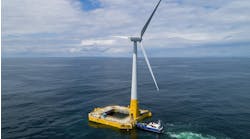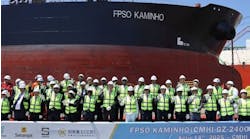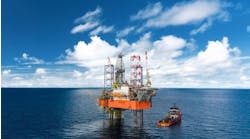The first UK continental shelf (UKCS) oil field ever to enter production, Argyll, is destined to be reborn in 2003 under the new name of Ardmore. Above all, the £55 million redevelopment of the previously abandoned field and its satellites by two emerging independents, Acorn and Tuscan, symbolizes the spirit and determination that is sustaining the North Sea as a leading oil and gas province.
Ardmore is more than a bold adventure that harnesses fresh thinking with the latest drilling and well technologies. It epitomizes sustainability, an increasingly core philosophy shared by the province's operators of all sizes.
With some 27 Bboe extracted from the UKCS to date, and with the potential to recover at least the same again, the prize remains enormous and critical to the economic well-being of Britain for decades to come, not merely as a source of domestic energy and income for the UK treasury, but also as a major engineering sector employer, a fertile seedbed for ground-breaking technologies, and increasingly, as a generator of valuable export revenues.
This is a time of great transition and it was always going to be difficult. The province is slipping deeper into maturity with oil output declining, gas production about to head the same way, and the average discovery size now modest at best, not counting recent surprises such as EnCana's Buzzard. Additionally, there is the specter of increasing competition for investment dollars from deepwater regions led by offshore West Africa and the Gulf of Mexico.
That UK Chancellor Gordon Brown has seen fit to hike corporation tax on profits derived from the North Sea from 30% to 40% to bolster public spending at this time is hardly helpful. Indeed, UK Offshore Operators Association (Ukooa) believes the move ill timed. It smacks of short-term thinking and may cost the treasury dearly in the long run.
Notwithstanding, there is a tremendous future ahead for the North Sea. Even if government does not relent on the current fiscal difficulty, the industry should continue to engineer solutions thanks to the prevailing spirit of cooperation, honed by successive initiatives over the past nine years and led today by steering group Pilot.
A critical challenge is how to encourage exploitation of some 250 fallow blocks and 130 fallow discoveries. With this in mind, a new register is being drawn up by the UK Department of Trade and Industry in cooperation with the industry, and the first batch of 40 or so offerings have been posted on the newly created UK License Information for Trading website in a move to unlock the untapped potential. In September, Energy Minister Brian Wilson opened a consultation seeking views on what changes could be made to UKCS licenses to stimulate greater oil company interest.
While not always obvious, today's UK North Sea business environment is one where independents do have a voice and one that is increasingly heard by their larger brethren, not least the super-majors. Though BP, ExxonMobil, Shell Expro, and TotalFinaElf continue to dominate and control much core infrastructure, that position is gradually changing through asset disposals to new generation companies exemplified by Talisman and Kerr-McGee, both of which have enthusiastically built up their UKCS positions since the mid 1990s.
A prime example of the kind of UK independent that will become increasingly important to the future success of the North Sea is Venture Production, which floated on the London Stock Exchange this March. It is lean and highly focused on tail-end production and associated satellite opportunities. This company is seen by leading venture capital provider 3i as a strong role model for others to emulate. Dana Petroleum and DNO are others rated for their innovative approaches. Another new entrant is CH4, created by a group of former Amerada Hess North Sea executives including Mark Routh, and Frances Gugen, who in the late 1990s strove hard to improve UKCS competitiveness through the cost reduction initiative Crine. These are forward-thinking, ambitious companies that may one day become as large as Enterprise Oil was prior to its acquisition by Royal Dutch/Shell.
Not that the majors are bowing out. With the prospect of a treaty being signed between Britain and Norway early in the new year to facilitate development of untapped reserves in a 60-km-wide corridor either side of the North Sea median line, there should be considerable additional third party cross-border business for core infrastructure such as Brent, operated by Shell Expro, and TFE-operated Alwyn North/Dunbar.
More than 60 oil and gas discoveries on both sides of the line – 31 Norwegian, 32 UK – have been identified as candidates for development under the 14-point plan mapped out by the strategy document "Unlocking value through closer relationships" prepared jointly by the UK-Norway North Sea Cooperation Group.
The area holds an estimated 13 Bboe of remaining oil and gas, two-thirds of which is oil. Corridor output is some 4.5 MMboe/d, which is almost half current overall UK/Norwegian daily production. The forecast is that oil companies will plow $71 billion into capital projects and keeping fields operational within the UK-Norway corridor through at least 2010.
The beauty of the corridor treaty project is that it will further enhance the viability of existing infrastructure, especially in the East Shetland basin in the north of the sector. This is important as the Pilot target of sustaining UKCS production at an average 3 MMboe/d through to 2010 is heavily dependent on raising recovery rates from existing backbone producing fields like Brent and Forties.
It means that, throughout 2003 and beyond, the work of the industry's Brown-field group, led by BP's Ian Hutcheson, will become especially important to the long-term success of the North Sea.
See www.oilandgas.org.uk for more information.




